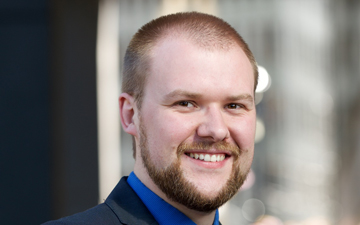How tough is the CPA Professional Education Program?

Student blogger Andrew Knapman speaks from experience about time management in CPA PEP
Editor's Note, 2021: Since the writing of this column in 2017, immersive cases (referred to below) have been replaced by integrated problems.
VANCOUVER – Just how tough is the CPA Professional Education Program (CPA PEP)? Other than "how to become a CPA in Canada," it’s a question asked constantly by aspiring CPAs, on social media, campuses and in conversations across Canada.
You never really know, of course, until you’re in CPA PEP, but what surprised me the most as a student was the familiarity of the content.
There is nothing technically about the program’s content that you shouldn’t already know from university and prep courses. The difference is that you now need to know everything you’ve ever learned — all at once.
Once I realized that, it felt like a huge weight off my shoulders. CPA PEP is intense, I won’t lie, but understanding its demands on your time is crucial.
How demanding is it?
When you enter CPA PEP, the most obvious change from university is you will now, most likely, work full-time while you study. This route will take around 2.5 years, if all goes well. You can technically pass the Common Final Examination (CFE), then obtain the necessary work experience, but this will take at least 4.5 years, so most students opt for the faster route.
You will work all day, study at night and, most likely, study on the weekends as well. If you joined a firm, you’re probably working much longer than an eight-hour workday. Most firms don’t allow you to study during their busy season, so the January–March offering is likely out of the question, extending your “sentence” by another three to six months.
What is my hourly commitment?
The official line calls for 10 to 20 hours a week of study. In reality, that’s underestimated. Why? Well, here’s a breakdown of a typical CPA Core 1 week, using a tool the program loves, the variance analysis:
 I believe that the program underestimates study time because they use a timeframe based on exam conditions. It assumes you know everything and spend zero time researching whilst completing a task.
I believe that the program underestimates study time because they use a timeframe based on exam conditions. It assumes you know everything and spend zero time researching whilst completing a task.
In reality, most students prefer to research and do a good job on an immersive case or multiple choice question (MCQ), rather than guessing and failing miserably like they would in an exam. As such, the program’s study times are usually way off what it would actually take most students.
That said, I do know some students who time themselves when completing an activity, so they are prepared for the time constraints in the exam. I’m of the opinion that it’s better to spend more time — and know all the content come exam day — than to stick to a limited timeframe and not have the required breadth of knowledge.
Now here’s the most glaring omission made by the program. The only material it expects you to read is material relating to the week’s content. But if all you studied came from the “Oracle” that the program provides, you will struggle.
I dedicate a huge amount of time to simply studying all the necessary material. I do this because of the enormous amount of material you need to know. Core 1 covers all of financial reporting, taxation, assurance and a bit of corporate finance. That’s most of your entire university learning in one exam. You have to study and study hard for this breadth of knowledge.
CPA PEP assumes you just know it? Give me a break!
What’s the bottom line?
Your study time will depend on your base knowledge level and short-term memory. If these are strong, you won’t need to dedicate as much time to general study and you can focus on the week’s lessons. Even then, you should add a good few hours above and beyond what the program expects.
If you’re like me and you need to study a lot to retain knowledge, you can likely double the program’s expectations.
Therefore, based on the 27 hours I have noted above, that equates to around three and a half hours per day of studying, including weekends. Maybe you can get away with as low as 20 hours per week (around three hours a day). Dedicate less and you likely won’t have the breadth of knowledge to pass the exam.
Bottom line, the CPA Professional Education Program has a reputation for stealing time from students, their spouses and loved ones. I can’t dispel it.
Andrew Knapman lives in British Columbia and is a student in the CPA Professional Education Program through CPA BC. The views expressed in this guest blog are his own. Follow him on his journey to becoming a Chartered Professional Accountant through future blog postings on Canadian Accountant.







(0) Comments